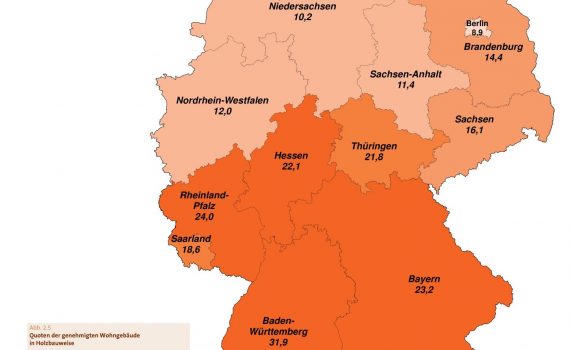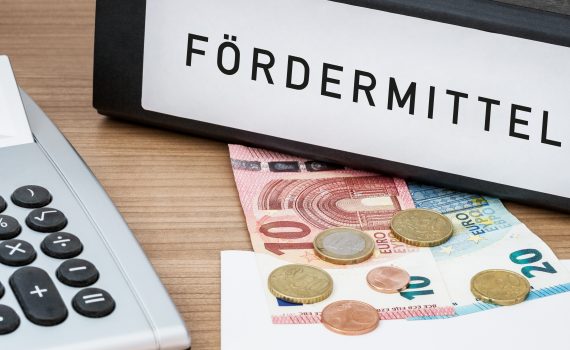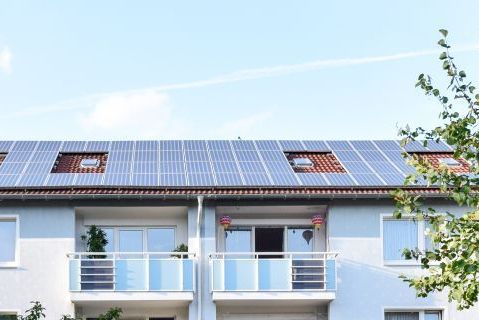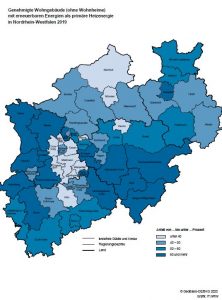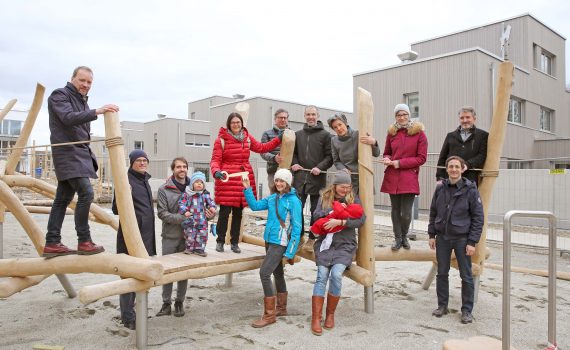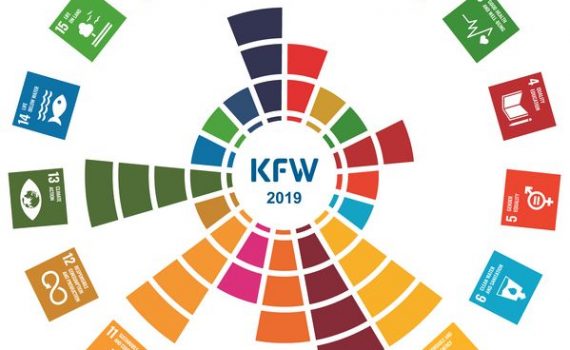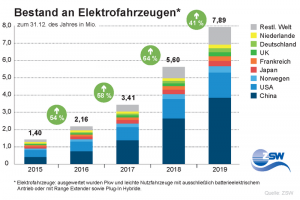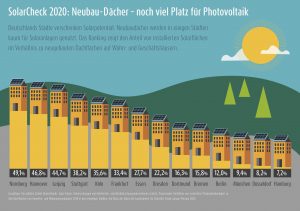 Good news for the PV industry: The solar cap will be abolished and solar expansion will be further promoted. The photovoltaic potential in Germany is enormous - especially when it comes to using roof space on new buildings. The new LichtBlick SolarCheck now shows in detail how well the 14 largest German cities are currently exploiting this potential. Enormous differences are revealed: While Nuremberg (49.1%) and Hanover (46.8%) exploit almost half of their potential, Munich and Düsseldorf do not even reach the 10 percent hurdle. The absolute taillight: the Hanseatic city of Hamburg with only 7.2 percent - one more reason for the solar obligation for new buildings planned by the mayor's office.
Good news for the PV industry: The solar cap will be abolished and solar expansion will be further promoted. The photovoltaic potential in Germany is enormous - especially when it comes to using roof space on new buildings. The new LichtBlick SolarCheck now shows in detail how well the 14 largest German cities are currently exploiting this potential. Enormous differences are revealed: While Nuremberg (49.1%) and Hanover (46.8%) exploit almost half of their potential, Munich and Düsseldorf do not even reach the 10 percent hurdle. The absolute taillight: the Hanseatic city of Hamburg with only 7.2 percent - one more reason for the solar obligation for new buildings planned by the mayor's office.
Kategorie für Blog: Ecology
Am 20. Juni ist kalendarischer Sommeranfang und vielerorts sind schon jetzt Trockenheit und niedrige Wasserstände in den Flüssen an der Tagesordnung, die Gewässer in Deutschland sind nicht gegen die Auswirkungen des Klimawandels gerüstet. Angesichts der verheerenden Zustände vieler Gewässer in Deutschland fordert der BUND einen Paradigmenwechsel im Umgang mit unseren Gewässern: Oberstes Prinzip in Zeiten des Klimawandels muss sein, Wasser in der Landschaft zu halten und Bächen und Flüssen ihre natürliche Dynamik innerhalb ihrer Auen zurückzugeben. Nur knapp acht Prozent der Flüsse und Bäche in Deutschland erreichen den von der europäischen Wasserrahmenrichtlinie geforderten guten ökologischen Zustand. Knapp 40 Prozent der oberirdischen Gewässer sind europaweit durch vielfältige Stressoren wie Klimawandel, Nährstoffeinträge durch die Landwirtschaft oder Begradigungen belastet. "Wir heizen die Erde weiter auf, gleichzeitig entwässern wir die Landschaft. Deshalb ist es keine Überraschung, dass es unseren heimischen Gewässern so schlecht geht", betont Olaf Bandt, Vorsitzender des BUND, mit Blick auf eine aktuelle Auswertung des BUND zu den Auswirkungen des Klimawandels auf Gewässer.
 Zur heutigen Kabinettssitzung und der dabei geplanten Befassung mit dem Entwurf eines Deutschen Ressourceneffizienzprogramms III (ProgRess III) erklären Dieter Janecek, Sprecher für Industriepolitik und digitale Wirtschaft, und Dr. Bettina Hoffmann, Sprecherin für Umweltpolitik und Umweltgesundheit:
Mit ProgRess III tritt die Bundesregierung auf der Stelle. Zwei Ressourceneffizenzprogramme der Bundesregierung konnten nicht verhindern, dass der deutsche Rohstoffverbrauch weiterhin steigt. Es ist absehbar, dass auch das dritte Ressourcenprogramm der Bundesregierung daran nichts ändert. Auch ProgRess III bleibt ein längliches Sammelsurium von Plänen, Ankündigungen und Prüfaufträgen.
Zur heutigen Kabinettssitzung und der dabei geplanten Befassung mit dem Entwurf eines Deutschen Ressourceneffizienzprogramms III (ProgRess III) erklären Dieter Janecek, Sprecher für Industriepolitik und digitale Wirtschaft, und Dr. Bettina Hoffmann, Sprecherin für Umweltpolitik und Umweltgesundheit:
Mit ProgRess III tritt die Bundesregierung auf der Stelle. Zwei Ressourceneffizenzprogramme der Bundesregierung konnten nicht verhindern, dass der deutsche Rohstoffverbrauch weiterhin steigt. Es ist absehbar, dass auch das dritte Ressourcenprogramm der Bundesregierung daran nichts ändert. Auch ProgRess III bleibt ein längliches Sammelsurium von Plänen, Ankündigungen und Prüfaufträgen.
The parliament of Bremen wants to oblige the use of solar energy on all new and existing buildings in Bremen and Bremerhaven. Whenever the roof surface is completely renewed, they are to be equipped with a solar system in the future. This is photovoltaics and, if necessary, also solar thermal energy. The Senate is currently examining the latter.
Lecture "Can we build our way out of the climate crisis?" from 16 April 2020
Among other things, Schellnhuber calls for "prompt measures to achieve the two-degree target, above all by switching from fossil to renewable energy sources and replacing finite building materials with wood and renewable raw materials."
State government launches climate protection support programme for citizens
Environment Minister Jan Philipp Albrecht today presented the state's new funding programme for private investment in climate protection. It starts on Tuesday, 9 June, and includes a bundle of support measures. Funding is available for the purchase of cargo bikes, e-charging stations, electricity storage systems, photovoltaic balcony systems, solar thermal systems, non-fossil heating systems and rainwater cisterns. The installation of a district heating connection and the installation of a green roof are also subsidised. Now that almost all 570 flats in Germany's largest timber-built housing estate in Prinz-Eugen-Park have been occupied, the Munich planning committee has recommended realising the timber-built follow-up project "Kreativquartier" with 370 residential units.
Here are the key data:
http://sdg21.eu/db/kreativquartier
Now that almost all 570 flats in Germany's largest timber-built housing estate in Prinz-Eugen-Park have been occupied, the Munich planning committee has recommended realising the timber-built follow-up project "Kreativquartier" with 370 residential units.
Here are the key data:
http://sdg21.eu/db/kreativquartier
Council of Ministers approves bill to amend state building code
In its meeting on 26 May 2020, the Rhineland-Palatinate Council of Ministers approved in principle a draft bill to amend, among other things, the Rhineland-Palatinate Building Code. The amendment of the state building code is intended to implement changes to the so-called model building code that have already been adopted or are in preparation. To ensure that significantly more houses in Hamburg are greened with plants on roofs and facades, the environmental authority is making €500,000 in funding available from 1 June. A maximum of € 100,000 and up to 40 % of the costs, applicants can receive in future in grants. Applications can be made from construction costs of €1,000. Funding will be provided for ground and wall-based greening of new and existing buildings, preparatory work, climbing aids, plants, planting measures, irrigation systems, completion maintenance and the ancillary costs for professional planning and supervision.
To ensure that significantly more houses in Hamburg are greened with plants on roofs and facades, the environmental authority is making €500,000 in funding available from 1 June. A maximum of € 100,000 and up to 40 % of the costs, applicants can receive in future in grants. Applications can be made from construction costs of €1,000. Funding will be provided for ground and wall-based greening of new and existing buildings, preparatory work, climbing aids, plants, planting measures, irrigation systems, completion maintenance and the ancillary costs for professional planning and supervision.
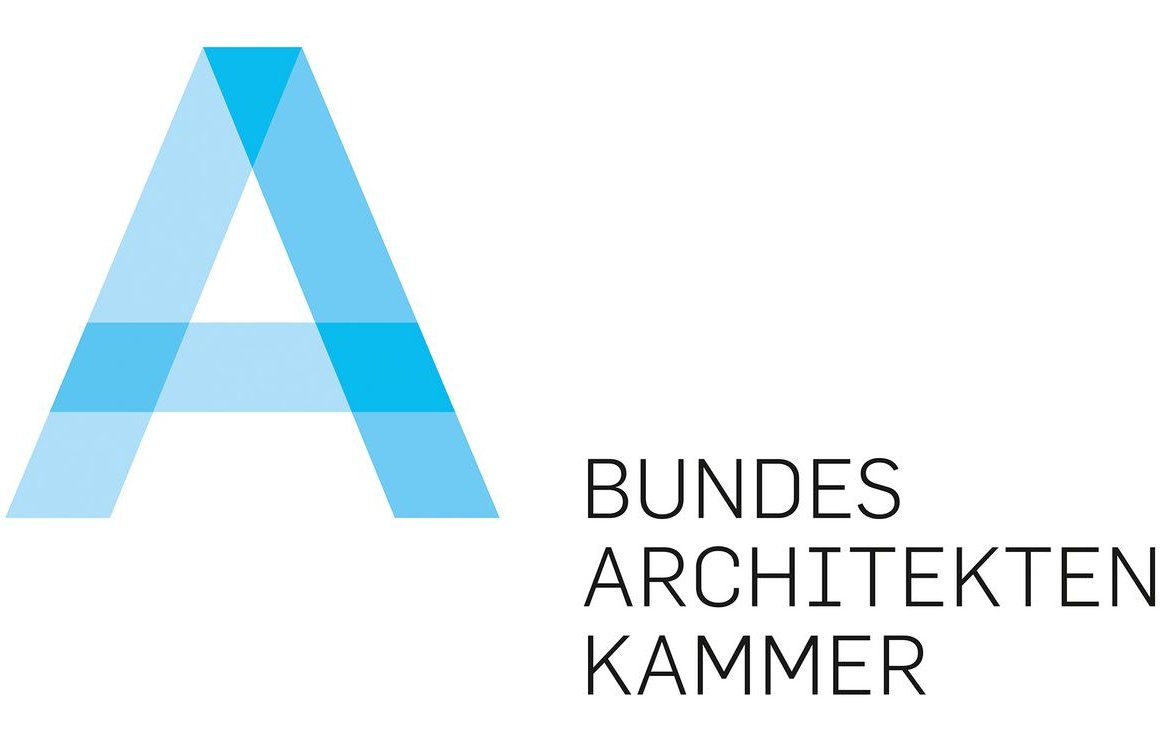 The Federal Chamber of Architects (BAK) and the Federal Foundation of Baukultur presented their proposal for a "Baukultur Innovation Programme" to politicians in Berlin today on behalf of the planning and construction industry.
Anne Katrin Bohle, State Secretary at the Federal Ministry of the Interior, Building and Community, accepted the four-point plan. In it, the authors suggest measures to overcome the coronavirus crisis that will have a lasting economic and social impact.
The Federal Chamber of Architects (BAK) and the Federal Foundation of Baukultur presented their proposal for a "Baukultur Innovation Programme" to politicians in Berlin today on behalf of the planning and construction industry.
Anne Katrin Bohle, State Secretary at the Federal Ministry of the Interior, Building and Community, accepted the four-point plan. In it, the authors suggest measures to overcome the coronavirus crisis that will have a lasting economic and social impact.
 Environment Minister Franz Untersteller reacted with relief to the agreement reached yesterday by the coalition on the amendment of the Climate Protection Act. The law is to be passed by the state parliament before the summer break and will then replace the previous climate protection law from 2013.
Environment Minister Franz Untersteller reacted with relief to the agreement reached yesterday by the coalition on the amendment of the Climate Protection Act. The law is to be passed by the state parliament before the summer break and will then replace the previous climate protection law from 2013.
 The discussion about climate change and the growing demand for living space have increasingly brought timber construction into the focus of planners, architects and developers over the past year. After all, sustainable timber construction can make a significant contribution to climate protection and the creation of living space. The increased interest in timber construction is also reflected in the industry figures: the turnover of companies grew by 7 percent in 2019 compared to the previous year, the number of employees increased from around 68,000 to around 70,000 and the timber construction rate continued to grow in both residential (new construction) and non-residential (new construction) construction.
The discussion about climate change and the growing demand for living space have increasingly brought timber construction into the focus of planners, architects and developers over the past year. After all, sustainable timber construction can make a significant contribution to climate protection and the creation of living space. The increased interest in timber construction is also reflected in the industry figures: the turnover of companies grew by 7 percent in 2019 compared to the previous year, the number of employees increased from around 68,000 to around 70,000 and the timber construction rate continued to grow in both residential (new construction) and non-residential (new construction) construction.
 Berlin/Cologne. Climate protection and adaptation to the consequences of climate change will become increasingly important for cities. This is one of the findings of the survey of (Lord) Mayors of large German cities* conducted by the German Institute of Urban Affairs in January and February 2020. Almost two-thirds of the respondents named climate protection as an important municipal issue for the future. This means that the number of mayors who attribute an increase in importance to this field of municipal policy action has more than tripled compared to the previous year. Future surveys will show how strongly this result was influenced by the protests of the 'Fridays for Future' movement.
Berlin/Cologne. Climate protection and adaptation to the consequences of climate change will become increasingly important for cities. This is one of the findings of the survey of (Lord) Mayors of large German cities* conducted by the German Institute of Urban Affairs in January and February 2020. Almost two-thirds of the respondents named climate protection as an important municipal issue for the future. This means that the number of mayors who attribute an increase in importance to this field of municipal policy action has more than tripled compared to the previous year. Future surveys will show how strongly this result was influenced by the protests of the 'Fridays for Future' movement.
The use of solar energy is an important pillar in the energy mix of the future and for the concrete implementation of the energy transition. At the end of 2019, around 1.8 million solar power systems with an output of 49,873 megawatt peak (MWp) were installed across Germany. With around 45 billion kWh of climate-friendly electricity, these accounted for a share of just under eight percent of German electricity generation. This amount is mathematically sufficient to supply 12.8 million households with electrical energy for a year. The approximately 280,000 turbines installed in NRW had an output of around 5,300 megawatt peak.
 Brussels/Freiburg, 5 May 2020 - An alliance "Solar Europe Now", officially launched on 5 May, is calling for solar energy to be recognised as a key technology for the objectives of the European Green Deal. The new alliance, which currently includes more than 90 players from the entire value chain of the European solar industry, is concerned that the photovoltaic sector is not being given enough consideration in the current presentation of the Green Deal.
Brussels/Freiburg, 5 May 2020 - An alliance "Solar Europe Now", officially launched on 5 May, is calling for solar energy to be recognised as a key technology for the objectives of the European Green Deal. The new alliance, which currently includes more than 90 players from the entire value chain of the European solar industry, is concerned that the photovoltaic sector is not being given enough consideration in the current presentation of the Green Deal.
Housing construction has great potential to contribute to resource conservation. For this reason, NRW.BANK supports developers with a new additional loan under the state's housing promotion programme. Wood as a building material already contributes to climate protection during the construction of a building. This is why the Ministry of Home Affairs, Municipal Affairs, Building and Equal [...]
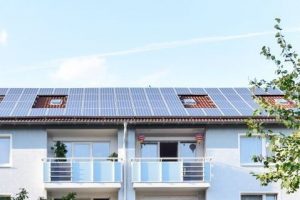 In Vienna, as a rule, no residential building may be erected without a solar system in the future. This is stipulated in an amendment to the building code, which is currently being evaluated, the red-green city government informed on Monday. Currently, such a photovoltaic obligation applies only to industrial buildings.
In Vienna, as a rule, no residential building may be erected without a solar system in the future. This is stipulated in an amendment to the building code, which is currently being evaluated, the red-green city government informed on Monday. Currently, such a photovoltaic obligation applies only to industrial buildings.
While the emergency aid for companies is getting underway, the debate about possible post-crisis economic stimulus packages is also gaining momentum. The German Green Business Association is proposing a transformation fund to combine a new start for the economy with social aspects and environmental and climate protection.
 Sustainable development is hardly conceivable without a consistent circular economy. Turning away from a predominantly linear economy requires a change of course. UBA has drawn up guiding principles for politics, business and society which systematically set out the objectives, scope for action, standards of action, requirements and success factors of a circular economy.
Sustainable development is hardly conceivable without a consistent circular economy. Turning away from a predominantly linear economy requires a change of course. UBA has drawn up guiding principles for politics, business and society which systematically set out the objectives, scope for action, standards of action, requirements and success factors of a circular economy.
 Hydrogen from hydropower: successful start for one of the largest power-to-gas plants in Germany to date. This is reported by the Centre for Solar Energy and Hydrogen Research Baden-Württemberg (ZSW). The megawatt plant has been in operation for four months in April 2020 and is functioning reliably. A research electrolyser connected to it is also running successfully. The ZSW is coordinating the project. The operator of the commercial plant is the energy supplier Energiedienst AG.
Hydrogen from hydropower: successful start for one of the largest power-to-gas plants in Germany to date. This is reported by the Centre for Solar Energy and Hydrogen Research Baden-Württemberg (ZSW). The megawatt plant has been in operation for four months in April 2020 and is functioning reliably. A research electrolyser connected to it is also running successfully. The ZSW is coordinating the project. The operator of the commercial plant is the energy supplier Energiedienst AG.
The Lower Saxony Timber Construction Prize has now been awarded for the third time. The aim of the state-wide competition is to strengthen the use of wood as a climate-friendly and sustainable building material, to present the current state of timber construction and to inspire future builders to build with this unique raw material. The Lower Saxony Timber Construction Award 2020 honours structures and buildings that are predominantly made of wood and wood-based materials and stand out for their high design and timber construction quality, as well as taking particular account of ecological and resource-saving aspects in the interests of sustainability.
 In research, neighbourhoods have been recognised as an important level of action for climate protection. For this reason, the BMBF, BMU and the Federal Ministry of Building and Transport have funded several research projects on sustainable neighbourhoods, which are now being worked on. The consensus of the research projects presented and the funding bodies is that it is important to research neighbourhood concepts for a climate-friendly heat and electricity supply as well as an environmentally friendly mobility offer in an economical way" and "to link the individual elements in the sense of a functioning sector coupling in a meaningful way."
The focus articles in the "Ecological Economy 3/2019" issue highlight the potential of the neighbourhood approach for the implementation of climate protection measures, but also present best practice examples and discuss feasibility in practice.
In research, neighbourhoods have been recognised as an important level of action for climate protection. For this reason, the BMBF, BMU and the Federal Ministry of Building and Transport have funded several research projects on sustainable neighbourhoods, which are now being worked on. The consensus of the research projects presented and the funding bodies is that it is important to research neighbourhood concepts for a climate-friendly heat and electricity supply as well as an environmentally friendly mobility offer in an economical way" and "to link the individual elements in the sense of a functioning sector coupling in a meaningful way."
The focus articles in the "Ecological Economy 3/2019" issue highlight the potential of the neighbourhood approach for the implementation of climate protection measures, but also present best practice examples and discuss feasibility in practice.
3:00 min. Published: 12.03.2020
The non-profit association GermanZero has taken the initiative and put together a comprehensive package of measures - now it is to be implemented. The initiative is seeking support with the video.
Joining us are:
Rike Schmid, Rezo, Jan Josef Liefers, Christoph Kramer, Carolin Kebekus, Charly Hübner, Jan Delay, Markus Kavka, Katrin Ingendoh, Andreas Rettig, Nik Xhelilaj, Rewinside, Mark Zwinz, Anneke Kim Sarnau, Emma Bading, Volker Bruch, Lars Jessen, Peter Jordan, Karoline Eichhorn, Wanja Mues, Jan Plewka, Marlis Heppeler, Steffen Weinhold, Katharina Wackernagel, Christine Urspruch, Raul Krauthausen, Rocko Schamoni, Mojib Latif, Joko Winterscheidt, Stephan Schad, André Schürrle, Moritz Vierboom, Friederike Kempter, Matthias Willenbacher, Axel Prahl, Maria Ketikidou, Mirella Precek, Jan Georg Schütte, Bjarne Mädel, Pheline Roggan, Andreas Altenburg, Lisa Maria Potthoff, Désirée von Delft, Peter Smits, Gustav Peter Wöhler, Ruth Toma, Maren Eggert, Benjamin Sadler, Fettes Brot, Jonas Nay, Stephan Kampwirth, Miriam Stein, Lea van Acken
 From the meeting of the Senate on 10 March 2020:
The Senate today adopted a comprehensive catalogue of measures to accelerate the expansion of solar energy in Berlin, following a proposal by the Senator for Economics, Energy and Public Enterprises, Ramona Pop.
Senator Pop: "The potential study for the Solarcity Masterplan has shown that we can harvest 25 per cent of the electricity generated with solar energy from Berlin's rooftops. We must therefore accelerate the expansion of solar energy in the city. It is necessary for the federal government to finally improve the legal framework for solar energy in cities. Nevertheless, we want to actively utilise the available scope at state level. With the Solarcity Masterplan, we will expand information and advice, provide incentives and also examine regulatory instruments. The implementation of the Solarcity Masterplan is a joint task for the Senate, but also for all Berlin stakeholders from business and society."
From the meeting of the Senate on 10 March 2020:
The Senate today adopted a comprehensive catalogue of measures to accelerate the expansion of solar energy in Berlin, following a proposal by the Senator for Economics, Energy and Public Enterprises, Ramona Pop.
Senator Pop: "The potential study for the Solarcity Masterplan has shown that we can harvest 25 per cent of the electricity generated with solar energy from Berlin's rooftops. We must therefore accelerate the expansion of solar energy in the city. It is necessary for the federal government to finally improve the legal framework for solar energy in cities. Nevertheless, we want to actively utilise the available scope at state level. With the Solarcity Masterplan, we will expand information and advice, provide incentives and also examine regulatory instruments. The implementation of the Solarcity Masterplan is a joint task for the Senate, but also for all Berlin stakeholders from business and society."
 City Planning Councillor Professor Dr. (l) Elisabeth Merk has now symbolically handed over the key to the members of the "Der Kleine Prinz" building association in Munich's Prinz Eugen Park. Their new building ensemble of atrium and point houses on Jörg-Hube-Strasse is part of the ecological model settlement there. In addition to apartments, two guest apartments, an ice cream café and a bicycle repair shop were built.
City Planning Councillor Professor Dr. (l) Elisabeth Merk has now symbolically handed over the key to the members of the "Der Kleine Prinz" building association in Munich's Prinz Eugen Park. Their new building ensemble of atrium and point houses on Jörg-Hube-Strasse is part of the ecological model settlement there. In addition to apartments, two guest apartments, an ice cream café and a bicycle repair shop were built.
 Konturen einer solidarischen Stadtpolitik
Anton Brokow-Loga (Hrsg.),
Frank Eckardt (Hrsg.)
Städte ohne Wachstum – eine bislang kaum vorstellbare Vision. Doch Klimawandel,
Ressourcenverschwendung, wachsende soziale Ungleichheiten und viele andere
Zukunftsgefahren stellen das bisherige Allheilmittel Wachstum grundsätzlich infrage. Wie wollen
wir heute und morgen zusammenleben? Wie gestalten wir ein gutes Leben für alle in der Stadt?
Konturen einer solidarischen Stadtpolitik
Anton Brokow-Loga (Hrsg.),
Frank Eckardt (Hrsg.)
Städte ohne Wachstum – eine bislang kaum vorstellbare Vision. Doch Klimawandel,
Ressourcenverschwendung, wachsende soziale Ungleichheiten und viele andere
Zukunftsgefahren stellen das bisherige Allheilmittel Wachstum grundsätzlich infrage. Wie wollen
wir heute und morgen zusammenleben? Wie gestalten wir ein gutes Leben für alle in der Stadt?
- Over EUR 28 billion for "climate protection measures": KfW is one of the most important supporters of the Paris climate goals
- Promotional bank is a global pioneer with its standardised SDG mapping
- Strong international interest in KfW SDG mapping
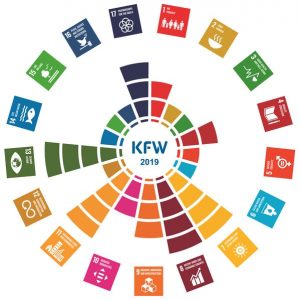 KfW is today publishing the results of the SDG mapping of new commitments throughout the Group in 2019. In order to clarify the individual contribution made by KfW's new commitments to achieving the UN Sustainable Development Goals, KfW has developed a standardised procedure: 1,500 indicators are used each year to determine to which SDGs KfW's new commitments can be assigned. This makes the contribution transparent at both group and business sector level.
KfW is today publishing the results of the SDG mapping of new commitments throughout the Group in 2019. In order to clarify the individual contribution made by KfW's new commitments to achieving the UN Sustainable Development Goals, KfW has developed a standardised procedure: 1,500 indicators are used each year to determine to which SDGs KfW's new commitments can be assigned. This makes the contribution transparent at both group and business sector level.
Min. 4:36; Video from 18.02.2020; Ed.: MWSP Mannheim
Mannheim's conversion is green - this is demonstrated by the work of the municipal development company MWSP on the TURLEY, TAYLOR, FRANKLIN and SPINELLI sites.
More new registrations, growth rate weakened / German manufacturers in 5th and 6th place
In 2019, the number of electric cars worldwide rose to around 7.9 million - an increase of 2.3 million compared to the previous year. The number of new registrations once again reached an all-time high, but grew only slightly compared to 2018. With a total of 3.8 million e-cars, China remains the undisputed global leader. It is followed by the USA with just under 1.5 million. The growth rate of new registrations declined in these two countries in particular. In Germany, on the other hand, the market continued to develop positively, albeit at a lower level: here, just under 231,000 electric vehicles were rolling along the roads at the end of 2019. The new figures come from a recent survey by the Centre for Solar Energy and Hydrogen Research Baden-Württemberg (ZSW). According to the researchers, Tesla recorded the most new registrations worldwide in 2019, with 361,000. German manufacturers continued to improve on the previous year: BMW is in fifth place worldwide with 114,500 electric cars. VW reaches sixth place.Funding is available for greening facades and roofs as well as for unsealing on private, public and commercial properties in the Hannover city area.
A further 700,000 euros will be available for #moinzukunft cargo bikes from 1 April. Up to 2,000 euros in subsidies are possible for the purchase of a new e-load bike and 500 euros for normal load bikes.






